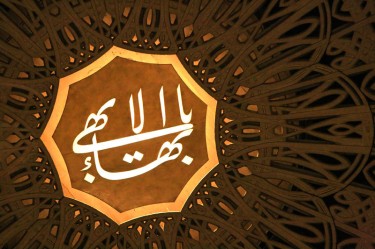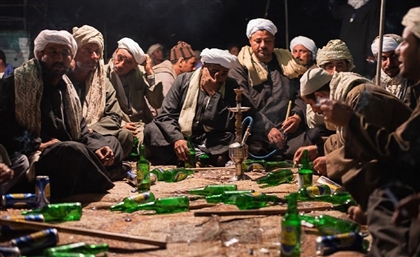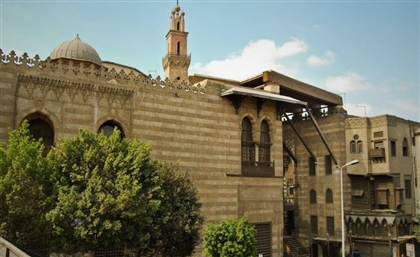The Plight of an Egyptian Bahá'í
For a long time members of the Bahá'í faith faced ostracism and even outright persecution in Egypt, and even now are only tentatively recognised. Eihab Boraie speaks to a member of the faith, who recounts his experience as a Bahá'í in Egypt.

Where I grew up in Canada, people tend to avoid subjects like religion, or politics, or anything that can breed controversy. So, when I relocated to Egypt, it was a bit of a change to have religion so visible, so central and just generally be a part of the everyday lives of millions.
In Egypt, only three religions are recognised and registered on every national's ID Card; Christianity, Islam, and Judaism. But globally, 19 ‘major religions’ are recognised, and there are over 4000 lesser known religions. After massive controversy and uproar in 2004, the Egyptian government decided to finally sort-of recognise one more religion; Bahá'ísm.
Admittedly, I knew very little about this religion, and decided to sit down with my colleague Bahaa Ibrahim, who is a fourth-generation Bahá'í. We discussed some points about the religion, and also what it was like to grow up as minority in a predominantly Muslim society.

The Bahá'í Faith was founded by Bahá'u'lláh in 19th-century Persia. “The Bahá'í faith is all about peace, unity, equality, and about your personal relationship with God. We don’t have sheikh or preachers, so the relationship with God is more direct,” Ibrahim passionately explains.
In a largely conservative society, acceptance of people’s diversity is an issue that the majority of Egyptians continue to struggle with, which for Ibrahim meant keeping his faith a secret. “It wasn’t popular to tell people I was Bahá'í, and Egypt’s education system forces you to study a religion; Islam or Christianity. Given no alternative, I decided to study Islam,” Ibrahim admits.
The first time that Bahá'í institutions and community activities came to light in Egypt was during Gamal Abdel Nasser’s reign. In 1960, it was officially deemed an illegal religion in Egypt. This decision led to Egyptian Bahá'ís suffering from continual persecution, including the government confiscation of Bahá'í centres, libraries, and cemeteries. This crackdown would eventually lead to the arrest of a prominent Egyptian artist, Hussein Bicar, for allegedly teaching the banned religion in the 1980s. He was eventually cleared of all charges due to his old age, and was ironically awarded the Mubarak Prize for the Arts in recognition of his various contributions in poetry, painting and music.

Faced with the reality that Bahá'ís are not accepted in Egypt, many continued to keep their faith a secret. For Ibrahim growing up Bahá'í wasn’t a problem until 2004, when Egypt finally entered the computer age. “Before 2004 everything was recorded on paper, making it easier to falsify information. After the decision to computerise the ID making system, there were only three religions to choose from; Islam, Christianity, or Judaism had to be present on every Egyptian ID, meaning that according to state I didn’t exist,” Ibrahim angrily explains.
Not having an ID in Egypt is a massive problem, especially when it is mandatory for every citizen to carry one. Without an ID card, members of the Bahá'í faith were left unable to obtain birth or death certificates, withdraw money from the bank, nor access government services like public hospitals and education. They could not process property titles/deeds, and were unemployable. “There are many police checkpoints in the streets that would stop you randomly and ask for your ID, and because I didn’t have one, I was constantly questioned,” Ibrahim recalls with frustration.
Left with no options, the Egyptian Bahá'í communities were forced to fight for their right to exist in a court battle that would last half a decade. With Bahá'ísm in the Egyptian media spotlight, many misconceptions and outright lies began to spread all across this prejudiced land.
“The Bahá'í case went viral in 2004, after Wael El-Ebrashi invited representatives of Bahá'í’ and Islam to his show, turning the crisis into a debate about which religion was correct. We didn’t want that, because we’re not here to prove that our religion is right or wrong. We were just Egyptian people who wanted our National ID,” Ibrahim explains with candor. The on-air debate led to some dark days for Bahá'í’s living in Egypt; almost overnight Ibrahim’s friends abandoned him, labeling him a freak.
“It is known in Egyptian society that people believe whatever we hear no matter who the source. Our religion is very similar to all the major religions, but with all the lies that spread, I would have ignorant people ask me if it was true that I slept with my mother or sister. Obviously, that is ridiculously absurd and demeaning.”
Just like in Islam, Bahá'ís pray and fast, amongst their other traditions. One notable difference is that Bahá'ís are accepting of other religions, a tolerance that is seemingly lacking within our society. According to Ibrahim, “The Bahá'í faith isn’t hereditary... So If I marry a Bahá'í woman and we give birth to kids, they aren’t automatically Bahá'í. Every believer must chose for themselves after they reach the age of 15, when they are mentally prepared to choose a faith. Being free of religious restrictions, I had the chance to explore different faiths. I participated in Islamic prayer in a mosque and at the same time have gone to church to pray. I found both experiences very similar, essentially it’s the same message, just different words.”
While court battles continued, with decisions being made and reversed, anti-Bahá'í sentiments continued to mount. “Before 2004-2006, we used to go to the Merryland [a park in Heliopolis] and celebrate our holidays. After Wael El-Ebrashi decided to stir up controversy on his show and divulge that Merryland was a Bahá'í ‘hangout’, many were advised that it was no longer safe to celebrate publicly. So we started to celebrate at home.”
Meanwhile, amid continued ostracism, the fight to be recognized as Egyptians waged on. Then on May 13, 2006, the Kifayah (Enough) Movement, a loosely organized group of civil society organizations, journalists, writers, artists and academics, issued a collective statement calling for an end to discrimination against Bahá'ís, which read:
"We confirm that this is not a case of the followers of the Bahá'í denomination only; it is the case of all minorities and faiths that are suffering from discrimination in Egyptian society for decades... Our attitude springs from a deep belief that calls for constitutional and political reform that cannot be separated from demands for the guarantee of freedom of belief and expression equally for every citizen, regardless of religion, ethnicity, gender or color. Otherwise, reform would become merely ink on paper and lose all meaning ... Today, the followers of a small denomination are sacrificed to fanaticism, but whose turn will it be tomorrow….if we remain silent now?"
With a unified opposition made up of a variety of intellectuals of differing faiths, pressure was being placed on the government to find a solution. On January 29, 2008 Cairo's Court of Administrative Justice ruled in favour of the Bahá'ís, allowing them to obtain birth certificates and identification documents, so long as they omit their religion, which would appear on an ID card as simply a dash. The first identification cards were issued under the new decree on August 8, 2009. For Ibrahim it wouldn’t be until July 2010 that he would officially exist as an Egyptian.

In a country that was once a hub of cosmopolitanism, culture and the arts, minorities now continue to face exclusion. Though some ground has been made, Egypt still has a long way before it can be considered an inclusive home for all its citizens.
- Previous Article Ramadan Guide
- Next Article Tableya: Homegrown Goodness
























